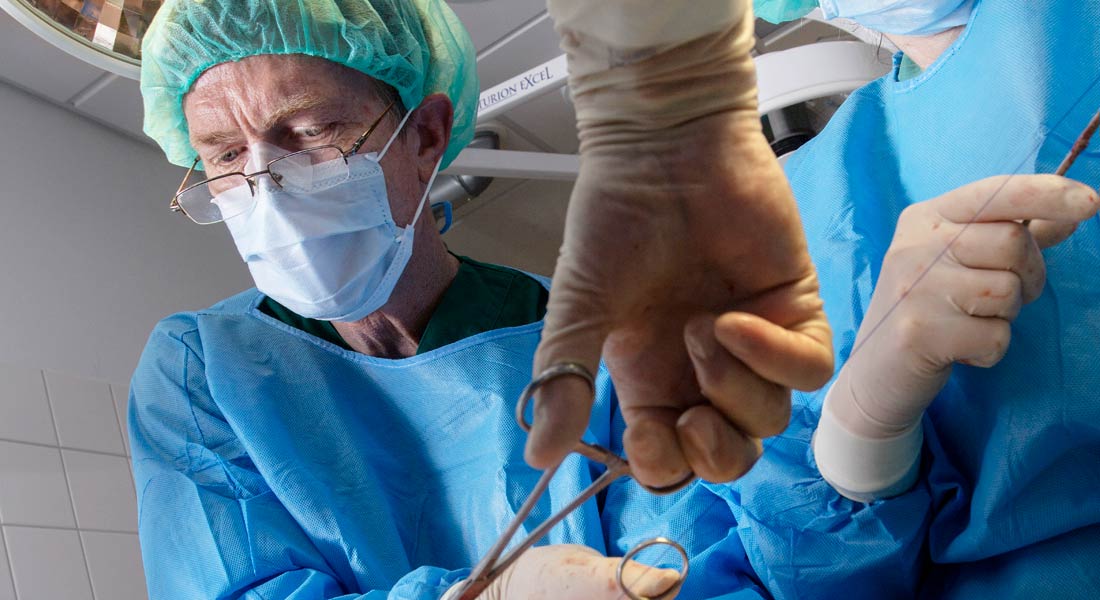Companion Animal Surgery – Orthopaedics III
Advanced Fracture and Joint Management
This course is a specialisation course at the Master of Companion Animal Clinical Science. The Master is a post graduate education targeted small animal veterinarians seeking Continuing Professional Development (CPD).
The purpose of this course is to extend the student’s knowledge, skills, and competences in the approach to, assessment, diagnosis, and management of the sick companion animal patient in need of advanced fracture and joint management.
The course will extend the students assessment and management of the companion animal patient in need of advanced fracture and joint management, orthopaedic surgery and plan the perioperative management of the patient, including specific anaesthesia and analgesia requirements.
Read more about the Master of Companion Animal Clinical Science.
A mixture of case-based and problem oriented lectures, e-learning, theoretical and practical exercises. Case-study work. Scientific literature.
Having completed the course, the student must be able to:
Knowledge
- Understand the aetiology, pathophysiology and clinical appearance of surgical fracture disorders
- Understand the influence of surgical fracture disorders on the musculoskeletal system and on the selection of anaesthesia and anagelsia protocols.
- Use and continue to develop common and typical techniques in musculoskeletal disease focused on advanced fracture and joint management.
- Explain, reflect about, and discuss a problem oriented and evidence-based work-up and treatment plan for patients with fractures.
- Define and identify relevant anatomical structures
Skills
- Perform advanced atraumatic and traumatic surgical techniques in advanced fracture management including:
- Fracture classification, fracture healing and absolute and relative stability
- Principles of using pin and cerclage, plates and screws, external fixator methods
- Implant selection
- Fracture management and surgical techniques for diaphyseal fractures, joint related fractures, pelvic fractures, fractures in growing animals, Salter-Harris fractures
- Arthrodesis and fracture complications
- Risk assessment after surgery with focus on treatment effect, complications and estimation of prognosis.
Competences
- Evaluate, plan and manage a diagnostic work-up for a patient with a complex history within companion animal advanced fracture and joint disorders.
- Plan advanced therapy/procedures for companion animal orthopaedic surgery patients with advanced fractures and joint disorders.
- Independently obtain, evaluate and elaborate on evidence-based new knowledge within companion animal orthopaedic surgery of patients with advanced fractures.
- Collaborate and communicate within and between specialist and non-specialist peers and laypersons involved in companion animal surgical patient fracture management.
You must meet the following criteria to be admitted to this course:
- Hold a degree in Veterinary Medicine
- Have a minimum of 2 years of relevant job experience from companion animal practice
- Be proficient in English
- Have completed the previous courses at the Companion Animal Surgery track.
Please consult the formal requirements for this course.
The course responsibles at the specialisation track in Companion Animal Surgery are:
- Professor James Edward Miles, Department of Veterinary Clinical Sciences, The Faculty of Health and Medical Sciences, University of Copenhagen, Denmark.
- Research consultant Dorthe Hansen, Department of Veterinary Clinical Sciences, The Faculty of Health and Medical Sciences, University of Copenhagen, Denmark.
Lecturers at the specialisation track are:
- Professor James Edward Miles, Department of Veterinary Clinical Sciences, The Faculty of Health and Medical Sciences, University of Copenhagen, Denmark.
- Research consultant Dorthe Hansen, Department of Veterinary Clinical Sciences, The Faculty of Health and Medical Sciences, University of Copenhagen, Denmark.
- Other national and international capacities within the field.
Course details
| Duration: | 5 days |
| Dates: | 4-8 March 2024 - class of 2022 2-6 February 2026 - class of 2024 |
| Frequency: | Only available every second year |
| Course capacity: | 24 students |
| Place: | Novara, Italy |
| Course fee: | EU/EEA citizens: 32,500 DKK Non-EU/EEA citizens: 36,033 DKK Tuition fees include hotel and full board. |
| Level and credit: | Master course; 4 ECTS |
| Examination date: | Please consult the exam schedule |
| Application deadline: | Master's programme: 1 May 2023 - class of 2024 |
| Admission: | Please consult the formal requirements for this course in the course curriculum |
The opening of the application period is announced via the programme newsletter.
Download course curriculum

